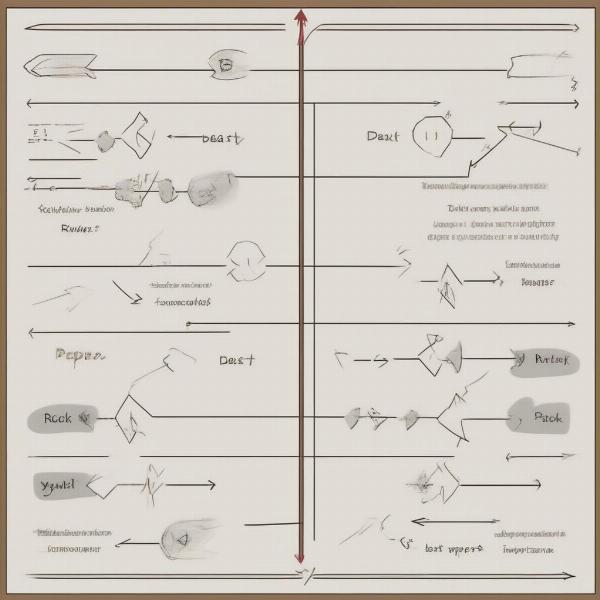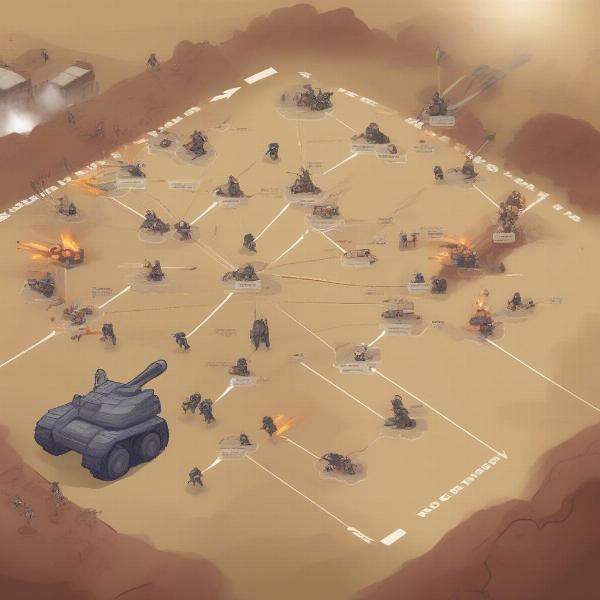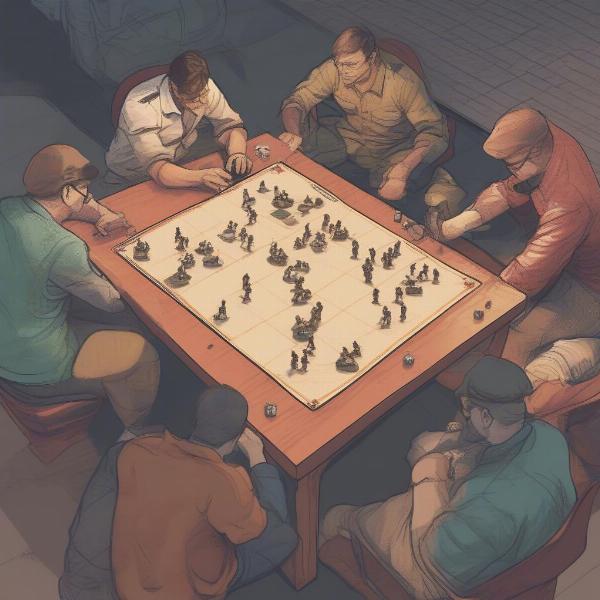Welcome, strategy enthusiasts, to another exciting exploration on supremeduelist.blog! Today, we’re diving into the surprisingly nuanced world of the Rock Paper Scissors War Game, a seemingly simple concept that blossoms into a battleground of wits and strategic thinking. Many people think it’s a mere game of chance, but we’re here to tell you that there’s much more to it than meets the eye.
Here at Supreme Duelist Blog, we strive to go beyond the surface, offering you in-depth analyses of games, dissecting mechanics, and uncovering the tactics that separate casual players from true masters. We believe that even games as seemingly basic as the rock paper scissors war game possess hidden layers of complexity, making them excellent case studies for exploring core strategic concepts. So, let’s get started and examine the depths of this deceptively profound game.
Understanding the Core Mechanics of a Rock Paper Scissors War Game
The foundation of any rock paper scissors war game is obviously the classic rock, paper, scissors mechanic. In its simplest form, rock crushes scissors, scissors cut paper, and paper covers rock. This cyclical relationship is the bedrock of the game, dictating how individual duels are resolved. But, unlike standard rock paper scissors, the “war game” component introduces strategic depth through team-based play and resource management.
 Understanding Basic RPS Mechanics
Understanding Basic RPS Mechanics
What Distinguishes a War Game?
The addition of “war” elements dramatically changes the nature of the game. Instead of single rounds, you have teams. Each team typically has a set number of players, each often equipped with a particular resource. The goal shifts beyond just winning a single duel; it’s about eliminating the opposing team strategically. This could involve capturing flags, defeating leaders, or simply outlasting the competition through careful resource allocation and tactical movements.
Resource Management: The Heart of Strategy
Resources in a rock paper scissors war game can take many forms. It might be that players have a limited number of “rock,” “paper,” or “scissors” tokens, forcing them to carefully plan each move. Some rulesets might incorporate health points or special abilities that can sway the tides of battles. A well-balanced team will carefully manage these resources to get the upper hand in a battle. This element is what truly elevates it beyond a simple kids game, transforming it into a test of tactical acumen.
Tactical Approaches in a Rock Paper Scissors War Game
Now that we understand the mechanics, let’s delve into the tactical layer of a rock paper scissors war game. Success isn’t solely about making the right choice each time; it’s about orchestrating a series of calculated moves to outmaneuver the opposing team.
Predicting Opponent Behavior
A key element of any strategy in this game involves trying to understand the opponent. Are they consistently playing the same moves? Do they favor one hand over another? In these games, observing your opponent and exploiting their tendencies can provide crucial advantages. Learning to read the nuances of your opponents will be paramount to victory.
The Power of Team Coordination
Effective communication and teamwork are paramount for any strategy in a rock paper scissors war game. Teams that coordinate their moves and resource expenditure typically perform much better than teams that act independently. Simple signals can allow you to set traps and control the flow of a battle. The best teams are often the ones that can effectively collaborate and adapt.
 Coordinated Team Strategy RPS Game
Coordinated Team Strategy RPS Game
Analyzing Risk and Reward
Every move in a rock paper scissors war game has risks and rewards associated with it. Choosing a predictable move might guarantee a win in a duel, but it also makes you more vulnerable to your opponent’s plans. The best players are able to calculate the possible outcomes and make well-informed moves based on the current situation. This adds a strategic depth to the game that can be difficult to master.
The Art of Bluffing and Mind Games
Like in poker, bluffing and mind games are incredibly powerful in a rock paper scissors war game. Sometimes it’s best to act contrary to expectations. Perhaps you want to make your opponent think you will play rock, leading them to counter with paper, only to play scissors and get an edge. By actively manipulating your opponent’s predictions, you increase the chances of a successful outcome.
Common Variations and Rules in a Rock Paper Scissors War Game
The beauty of the rock paper scissors war game lies in its flexibility. Numerous variations and rules can alter the game significantly. It is important to be mindful of how rules and limitations change strategies.
Elimination vs. Point Based Systems
Some versions of the game focus on elimination, where players are removed from the game if they lose a certain number of duels. Other versions of the game may use a point-based system, where teams gain points for winning duels or achieving specific objectives. These different styles require different strategies and approaches.
Adding Special Abilities or Power-Ups
Certain rulesets may introduce special abilities or power-ups that can change the flow of a battle. These could range from the ability to force the opponent to reveal their hand, or to guarantee a winning move. These elements add a level of randomness and can add an extra layer of tactical planning.
Different Team Configurations
The size of teams and their makeup can significantly affect the game. Having teams with different numbers of players, or teams with unique roles, changes the dynamics of play and require different sets of strategies.
How Does the Environment Impact the Game?
Even the environment where you play the rock paper scissors war game can have a tactical element to it. For instance, the playing area could have different zones that provide certain advantages or hinder specific movements. Adding elements to the physical space can influence player behavior and force them to adjust to dynamic changes.
“It’s fascinating how such a simple game can be so profound. When you add the team-based element, you create new layers of tactics and strategy.” – Dr. Evelyn Reed, Game Theory Expert
Frequently Asked Questions about Rock Paper Scissors War Games
Let’s tackle some common questions that arise when diving into rock paper scissors war game strategy:
What Makes Rock Paper Scissors War Games Different From Regular RPS?
The addition of teamwork, resource management, and strategic objectives turns a simple game of chance into a complex exercise of strategy, communication, and adaptation. Regular RPS is a quick, individual contest. The war game is about more than single duels; it’s about a whole battle.
How Important is Teamwork in Rock Paper Scissors War Games?
Teamwork is absolutely critical. Coordinated movements, resource sharing, and effective communication can make a team significantly more powerful than a group of individuals acting alone. Teams must work together to achieve the shared objective.
Can You Really Improve Your Rock Paper Scissors War Game Skills?
Yes, absolutely. By focusing on understanding opponent behavior, mastering risk and reward analysis, and coordinating with teammates, you can significantly improve your success rate. It is more than chance, it is about strategy.
 Improving Skills RPS War Game Strategies
Improving Skills RPS War Game Strategies
What Are Some Common Mistakes Players Make?
A common mistake is underestimating the importance of resource management, and failing to predict your opponent’s moves, or neglecting the power of mind games. Players often rush into battles without proper planning.
How Can I Practice and Get Better?
Practice with different teams, try out new strategies, and pay attention to your successes and failures. Learning from your errors and adapting your approach is key to improving your game. The more you play, the better you’ll get!
“The mental aspect of these games is often overlooked. The ability to outwit your opponent is just as crucial as the physical aspect.” – Professor James Chen, Cognitive Psychology Scholar
Conclusion: Mastering the Art of the Rock Paper Scissors War Game
As we’ve explored, the rock paper scissors war game is not merely a child’s game; it’s a dynamic battleground of strategy and teamwork. It blends the simple mechanics of classic rock paper scissors with the strategic depth of war games, offering a rich gaming experience for those who delve deeper into its tactical layers. Understanding how to manage resources, read opponents, coordinate moves, and employ mind games are all essential components in becoming a true master of the rock paper scissors war game.
We, at supremeduelist.blog, are dedicated to uncovering these layers, providing you with insights that elevate your gameplay and understanding. Now it’s your turn! Take what you’ve learned, gather your teammates, and embark on your own rock paper scissors war game journey. Don’t forget to share your experiences and strategies with us in the comments below! What are your favorite tactics? Which variations do you enjoy the most? We are eager to hear from you! And don’t forget to check back here for more in-depth explorations of the world of games.
Leave a Reply